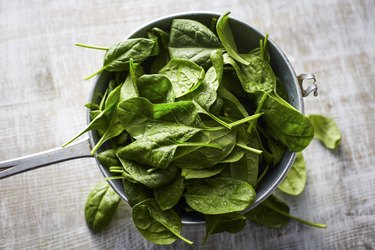
Looking for electrolyte-rich drinks? First, make sure you understand why these nutrients are necessary. Electrolytes are minerals that carry an electric charge.
Your body needs them to regulate nerve and muscle function, maintain acid-base balance and maintain fluid balance. Electrolytes like chloride, potassium, sodium, magnesium and calcium can be lost through sweat and need to be replaced through the foods you eat.
Video of the Day
Video of the Day
Sodium and Chloride Foods
Sodium and chloride — the two electrolytes that make up table salt — are present in foods together and help maintain fluid balance for proper cell function.
Foods containing sodium and chloride include table salt, beef, pork, sardines, cheese, olives, corn bread and sauerkraut. All processed and canned foods made with added salt, such as deli meats, chips and other snacks, nuts, butter, margarine, mayonnaise and many condiments, have both sodium and chloride.
However, because most Americans already get more much sodium and chloride than they need, it's recommended not to exceed 2,300 milligrams of sodium daily, recommends the American Heart Association.
Potassium-Rich Foods
Potassium is found in a multitude of fruits and vegetables, especially leafy green veggies. Spinach, turnip greens, collard greens and kale, bananas, tomatoes, oranges, melons, potatoes and sweet potatoes, prunes, raisins, peas and beans are just a few examples. Milk and salt substitutes made from potassium chloride are good sources too.
This mineral supports normal cell function, regulates blood pressure and protects against bone loss and kidney stones. A diet low in potassium may cause mild to severe complications ranging from fatigue and glucose intolerance to abnormal heart rhythm, difficulty breathing and cardiovascular problems, as the National Institutes of Health points out.
The daily recommended potassium intake is 2.6 grams for women and 3.4 grams for men; These requirements increase during pregnancy. Consider drinking electrolyte-rich drinks to get more potassium in your diet. Ideally, opt for sugar-free brands. Better yet, consider switching to a mineral water rich in electrolytes.
Read more: The Benefits of Electrolytes in Water
Key Electrolytes in Food: Magnesium
Magnesium supports bone and teeth development, nerve and muscle function and protein synthesis. Getting enough magnesium in your diet may also protect from high blood pressure, a factor that increases your risk of heart disease. In fact, this mineral is involved in over 300 biochemical reactions.
Leafy greens, beans, nuts, avocado and oatmeal are all rich in magnesium. If you're a woman, get at least 310 milligrams of this mineral per day. Men should aim for 400 to 420 milligrams per day, depending on their age. Beware that magnesium deficiency can lead to nausea and fatigue, muscle cramps, calcium and potassium deficiencies, cardiovascular problems and more.
Foods Rich in Calcium
Your body uses calcium for bone and teeth formation, blood clotting, muscle and enzyme function and vasodilatation, among other processes. This mineral is most commonly found in milk and dairy products. Meat, fish with bones, such as sardines, as well as eggs, fortified breakfast cereals and beans contain calcium too. You can also eat dried apricots, figs, asparagus and collard greens to increase your calcium intake.
About 99 percent of this mineral is stored in the teeth and bones, as the National Institutes of Health notes. Most people only absorb approximately 30 percent of the calcium in foods. Therefore, taking dietary supplements or drinking electrolyte-rich drinks may help prevent deficiencies and keep your bones healthy. The National Osteoporosis Foundation warns that calcium deficiency may accelerate bone loss and affect bone density.
Electrolyte-rich drinks may help balance your fluid and electrolyte levels. However, these beverages are not necessarily healthy. Many brands pack a lot of sugar, artificial food colorings, synthetic flavors and preservatives. Look for a beverage with no added sugar or choose an organic brand made with stevia, a natural sweetener.
- MedlinePlus: "Electrolytes"
- American Heart Association: "How Much Sodium Should I Eat per Day?"
- National Institutes of Health: "Potassium"
- National Institutes of Health: "Magnesium"
- National Institutes of Health: "Calcium"
- National Osteoporosis Foundation: "Calcium/Vitamin D"
- Nephrology Channel: Electrolyte imbalance